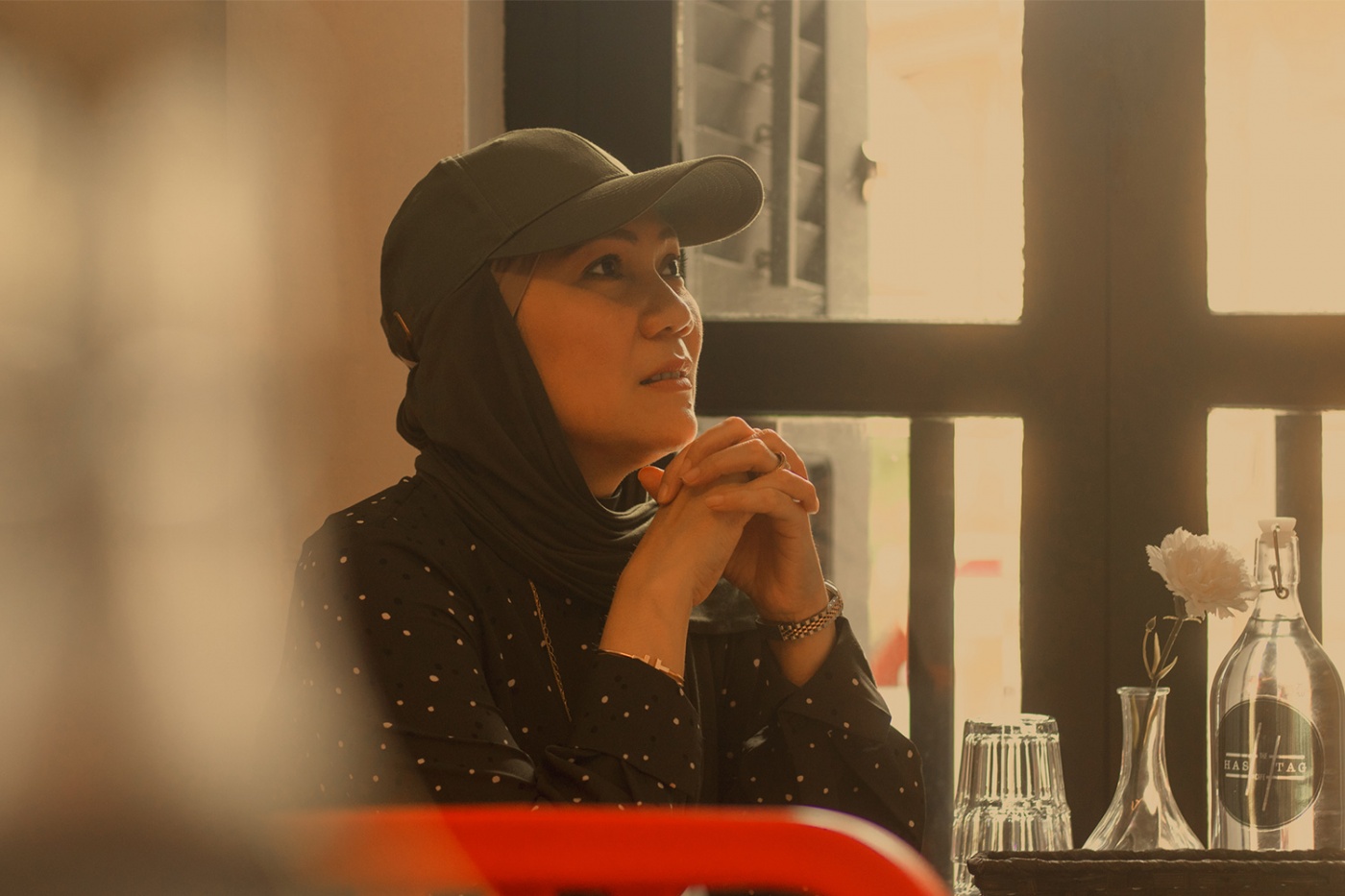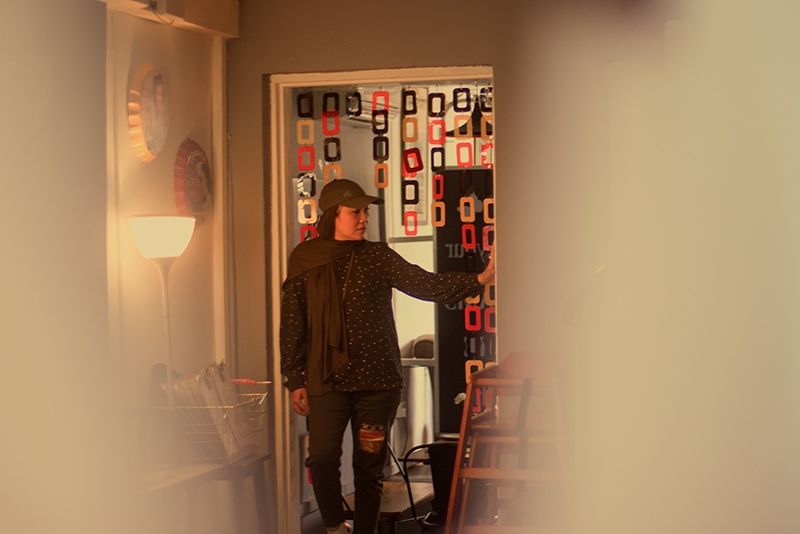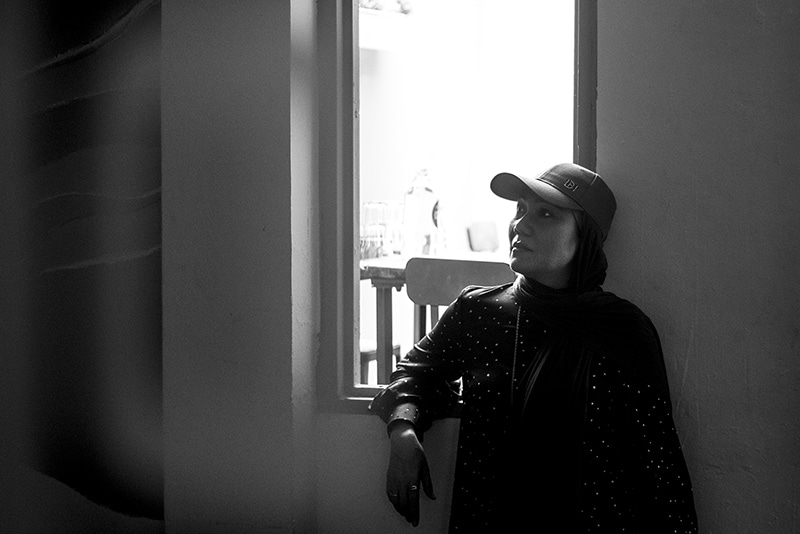At 50, Actress Mastura Ahmad Is Still Looking for New and Challenging Roles to Play
Ridzwan’s mum steps out of the room, still clad in her white prayer garb, perturbed by a sudden interruption to her midday prayer after overhearing a muffled conversation between her son and an unknown person who has shown up at her home unannounced. Moving closer, she eyes both of them suspiciously, yet with a tinge of curiosity. The unidentified man offers a polite handshake, but gets turned down by Ridzwan’s mum. An awkward pause follows. Ridzwan introduces him as Jeremy, a colleague from work who is here to deliver some cakes. Out of common courtesy, she flashes a faint smile and thanks Jeremy for the kind gesture. Before leaving, she turns to Ridzwan and reminds him to pray.
In that scene from a web series created by People Like Us, Ridzwan’s mum played by Mastura Ahmad—an actress who has brought to life many often complex, layered, and surprisingly, human characters—showcases her acting prowess through nuanced mannerisms and body language. The same can be said about her character in the movie Apprentice, where she plays Suhaila, sister to Aiman who is often sullen, moody, and torn between wanting to chase after her own lofty romantic aspirations and keeping ties with the only family she has left.
I’m taken completely by surprise when I meet Mastura in person on a Saturday morning for coffee and light bites at Hashtag Cafe along North Bridge Road. Wearing an olive green blouse and matching pants with an activewear hijab tucked under her cap, she is chatty, joyful, exuberant, and always ready to smile—a far cry from the roles she often portrays on television or the big screen. “When I’m acting, that’s the only time I don’t get to be me. I guess that’s why I love this craft so much,” she says.
Over the slow, steady march of thirty years in the entertainment industry, Mastura has redefined what it means to be a highly sought after actress in both Malay and English productions. Throughout her career, she has embodied different versions of womanhood, and often typifies the matriarchal image without ever being one-dimensional by seeking out roles that push the boundaries of age and racial norms.
In this interview, we learn about the secret to the longevity of her career, the proliferation of roles for Malay actors in Channel 5, and how wearing the hijab has changed the way she approaches acting.
High Net Worth: What was your childhood like growing up?
Mastura Ahmad: I lived and grew up in Telok Paku because my dad worked for the British Army then and we were given housing to stay there. I stayed at Jalan Paku till I was six years old before my family moved to Jalan Darat Nenas.
My family was one of the few families in our kampung fortunate enough to own a television set. This was during the 70s—the golden era of P Ramlee movies. Every Friday, we will invite our neighbours in the village to come over to my house to watch the latest P Ramlee film. Having a television at home exposed me to television shows and movies, and I guess that’s where my love for acting first bloomed.
When did you become serious about acting and being in show business?
When I was in Upper Serangoon Technical School, I was substantially involved in ELDDS (English Language Debate and Drama Society). One day, the entire team went to watch a theatre production by Persatuan Kemuning, and honestly, I didn’t really know anything then about theatre. I was shocked by how loud the actors were on stage and wondered if this was what acting on stage was all about. Shortly after, I was selected for a supporting role in Usman Awang’s ‘Muzikal Uda dan Dara’. That performance proved to be the turning point in my career as an actress because Sabri Buang, a theatre activist and former dean of Lasalle School, was in the audience. He saw what I could do on stage and cast me in his first play, which led to my breakout role in ‘Tingginya Menyapu Awan’ written by Osman Awang. I played the character of a mentally disabled teenage girl—and had only two lines: Susu (milk) and Anggur (grape). It was not a role other actors would gravitate towards because of the physical and mental deformity that needs to be portrayed convincingly. But for me, I thoroughly enjoyed myself. I suppose everything I’ve achieved now can be attributed to my theatre work.
Has wearing the hijab changed the way you approach acting?
When I’m acting, that is the only time I get to be someone else other than myself. And part of my identity is wearing this hijab—a decision I made a few years back after completing my Umrah (non-mandatory lesser pilgrimage made by Muslims to Mecca, which may be performed at any time of the year). However, wearing the hijab limits the types of roles I can play. Right now, that’s my battle. Both my characters in Kin and Tanglin do not wear the hijab, and I’ve received numerous flak from my community about it. People have said so many terrible things to me. But this is a conscious decision I’ve made on my own, so I am willing to accept whatever criticisms and negativity that come with it. I understand that it’s just part of a job of being an actress.
When I attended the Cannes Film Festival for Apprentice, I was struggling with whether I should wear my hijab or not. So, I decided to do an experiment. There were two red carpet events at Cannes: The main event was where all the renowned actors walked in and all the journalists from the world over know their names. They would shout out your full name numerous times to catch your attention because they want you to look at them. I chose not to wear my hijab there.
For the second red carpet, I decided to wear my turban. There was a discernible difference in the way I was approached—lesser people came up to me to say hello or to find out more about the work that I do. There were many directors, but I guessed that when they saw me in a turban (or a hijab for that matter), it was limiting in terms of the roles I could play. This is something I still struggle with.
Did you also struggle with the hijab issue when you were cast in Tanglin and Kin?
When it comes to television programmes made for Singapore channels, you can discuss and go into as many details as you want about the culture of the different races in Singapore. But, when it comes to religion, then things get a little bit more complicated. For Tanglin, it was challenging for the writers and producers to write a story arc of my character’s religious journey towards wearing the hijab. For Kin, the problem was different. There was a worry that if I wore a hijab on the show, and my character is a scheming woman or someone who has an affair, it will reflect very poorly on the community I represent. So, we came to a compromise and decided that I would wear a wig. I regard it as my uniform for work. I know that what I’m doing is not right—I choose to wear the hijab, yet I still want to do new and exciting roles—it’s a fight that I have to live with every day.
I’m so surprised that even at the age of 50, you still crave for new and exciting roles.
When I was younger, there just weren’t that many drama serials on television, and the characters were definitely not as exciting or broad as the ones I’m playing now. It’s only recently that the writers are beginning to write meatier roles for Singapore television. I’m always on the lookout for parts written for someone my age that’s vastly different from what I’ve always been doing. I just watched The Favourite, and I would have loved to be able to play the type of characters like the ones portrayed by Queen Anne and Sarah Churchill in the movie where they become lovers—but of course without any physical love scenes. Those are the kind of challenging roles I would enjoy playing.
Speaking of challenging roles, you had a small part in the gay YouTube series, People Like Us, which was an initiative by Action for Aids.
Oh, that was a very short cameo. But right from the beginning, I made sure to ask Leon, the director, whether my character was accepting of my son’s (Irfan Kasban as Ridzwan) homosexuality. Because if I was, I knew it would be an issue with my community—especially since in that scene, I was wearing my prayer garb, and it was going to be shown in Singapore. It turned out that my character was in the dark about her son’s homosexuality although she clearly looked uncomfortable in that situation. However, I must add that if it was not shown here locally, I would have absolutely no problem playing the character of a mother who is approving of her gay son’s choices in life. Ultimately, I want to respect the community I’m living in.
Are you surprised that there is a sudden influx of Malay actors holding major roles on Channel 5 in recent years?
Yes and no. I feel that Malay actors have always been talented, but the producers from other channels don’t seem to want to tap on their talents. I think another reason is that television stations now realise that the Malay population in Singapore still watch television as compared to the other races who have switched to streaming services. The number of viewers for Suria has always remained consistently at more than 90% of the Malay population in Singapore. I feel that’s maybe the reason why they’re doing these crossovers—to attract the viewers from Suria to watch these programmes helmed by Malay actors over at Channel 5. That’s just my guess based on my observation of trends in television.
How do you think the TV landscape has changed in the 30 years that you’ve been in the industry?
The most significant change is that with social media, now everyone can be an actor. I have been in this industry for 30 years, and at times, I feel that instant stars like Dato Aliff Syukri and Dato Seri Vida are making a mockery of this craft that I love and have worked so hard to hone. But I also know how difficult it is for them to stay relevant because every day they need to think of something new and exciting to show. So, in a way, I do appreciate and relate to the hard work they’ve had to put in. But I cannot say conclusively if the proliferation of these social media actors has contributed to the reason why people now generally don’t seem to appreciate or understand the authenticity of the craft that actors such as myself have worked on over the years.
What was it like working on the set of Apprentice with Boo Junfeng back in 2016?
I was told to go for an audition by a makeup artist I used to work with. I enjoy going for auditions, unlike other veteran actors who think that, having been in the industry for so long, casting directors should know exactly what type of roles they are capable of. But to me, I love auditions because it’s the rare times where I get to surprise other people with what I can do.
So I went to Goodwood Park Hotel for the Apprentice audition with the casting directors and for one full year after that, I didn’t get any news about whether I was cast or not. Fast forward a year later, I was called back for a second audition— this time around, Junfeng was present. My third and final callback was to do a scene with Fir Rahman, and that was how I was cast for the role of Suhaila, the older sister of Aima. One of the reasons why I really wanted to do this was because I wanted to bring awareness to the fact that there are talented Malay actors in Singapore.
Even after being cast, I didn’t know what the genre of the film was or even what the movie was about. The audition scripts we worked with were short excerpts of scenes that, separately, didn’t paint a full picture of the film. It was only after the first script reading that I realised that this was a film that dealt with a very heavy subject.
As filming went on, I honestly thought that I was executing my character development well. But one particular scene stuck with me till today—it was a scene where I had an argument with Fir Rahman’s character, Aiman, that ends with me slapping him across the face. We had to redo the scene so many times to the point where I was already crying for real; tears streaming down my face and still, Junfeng found it unsatisfactory. The last time I cried that intensively was with my dad in real life.
So for the last take, I remember feeling all this intense emotion welling up within me, and when it was time for me to execute the scene, I did just one line, completely ignoring the script direction, and instinctively raised my hand to slap Aiman hard across his face. That was the take Junfeng used.
From then on, I finally understood what Junfeng wanted. He wanted real, raw, and spontaneous acting which was something I’m completely unused to having done mostly television productions. I learned so much about myself and my craft as an actor from being on set with Junfeng—the director plays such an essential role in expanding my artistic capabilities. That’s why I’m always excited to work with the younger generation such as Junfeng because I know that in some ways, they are teaching me to be a better artist too.
Do your kids aspire to be in the same line as you?
Actually, I think all of them have the potential to be actors, especially my daughter. Unfortunately, I had not exposed them to the world of television when they were younger—I don’t bring them on set often because I don’t want to be distracted while filming and having to worry about whether my children are doing alright on their own. My daughter did have a hand at acting once when she was 4 years old. She’s excellent at crying on cue, but she isn’t intrinsically aware or understands the processes of filming. So, after being asked to do a scene a couple of times, she got frustrated and told the director, “When you are ready, let me know. I don’t want to do so many takes.” [laughs] She never acted after that.
Which is more important for an actor? Talent or hard work?
Neither. What’s most important is passion and work ethics. Most people don’t know this about me, but I love what I do so much that if I were to fall ill, it only happens during my days off. It’s as if my body knows that I have a responsibility to carry out. With every job that I do, I make sure that I’m fully committed to the character, script, and filming schedule. I’ve come to realise that people are always observing one’s work ethic and if I carry myself professionally, it will guarantee my next job. So, I take every single job seriously. I feel very stressed when I see other actors who don’t take their craft seriously. For me, if given the opportunity, no matter how small, I will dedicate myself to the role, because you never know if this little project with a minimal budget might lead to more significant opportunities than you can ever imagine.




